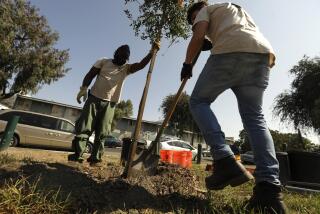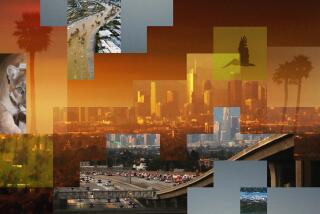Lancaster OKs Limits on Clearing of Vegetation
Trying to keep the community from becoming a development-induced dust bowl, the Lancaster City Council has passed an urgency law to restrict property owners from clearing their land of natural desert vegetation such as the native Joshua tree.
The council’s 5-0 vote Monday night came, coincidentally, after a day in which high winds raked the Antelope Valley, kicking up dust and sandstorms that swirled across broad open stretches of the fast-growing high desert area.
“We have a tremendous dust problem,” said Lancaster Mayor Lynn Harrison, who sponsored the measure. She said the desert’s naturally dusty environment has worsened because developers have been rushing to clear land of vegetation, either as a prelude to building or in fear of future restrictions.
Harrison called the area’s dust and sand problems part of the price of progress for development. But she said the city must still do what it can to limit the problems. “You can’t treat the desert in a cavalier fashion and not have it bite you back,” Harrison said. “Dust is one of the desert’s revenges.”
Protection for Soil
When natural desert vegetation such as Joshua trees, California junipers and desert scrub are left in place, city officials said, they provide some reinforcement and protection for the soil. Without them, high winds sweep the dry soil off the ground, creating the high desert’s equivalent of smog.
Under the new city law, which took effect immediately, property owners cannot clear the vegetation from any lot larger than half an acre without a special city permit. Before issuing such a permit, the city must find that the work “will not result in significant blowing dust or erosion of topsoil.”
There was little debate on the measure at Monday night’s council meeting, even though violators would be subject to criminal misdemeanor penalties. However, attorneys for the local Building Industry Assn. chapter protested that the new law is not needed.
“This represents another layer of governmental enforcement which, in our opinion, is not necessary,” Terence A. Baird, the association’s attorney, said in a letter. He acknowledged that the dust problem has been constant in the valley for years but contended that existing regional air quality regulations are sufficient to control the dust problem.
In Lancaster and the neighboring city of Palmdale, city officials typically impose on developers conditions that govern grading and landscaping at their projects. Future grading permits will include the new land clearance permit.
But until now, neither city had any control over clearing of land until a developer requested city permits.
Harrison cited a case in Palmdale several months ago in which a large stand of Joshua trees was cut down on private land near the Antelope Valley Country Club. Because no construction project was under way, Palmdale’s laws then and now could not prevent that cutting, city officials said.
Lancaster’s tougher laws designate special desert woodlands areas containing stands of Joshua trees. Developers seeking city permits must leave up to half the land in those areas undisturbed. But Harrison said she still gets complaints of land stripping and dust problems in other parts of the city.
The debate over blowing dust is linked to a related issue in both cities over proposals to better preserve the region’s Joshua trees. Those measures have stalled for now.
But Harrison suggested that some of the recent reported clearings of vegetation in Lancaster may have been done by owners trying to escape future restrictions on Joshua tree cutting.
More to Read
Sign up for Essential California
The most important California stories and recommendations in your inbox every morning.
You may occasionally receive promotional content from the Los Angeles Times.










